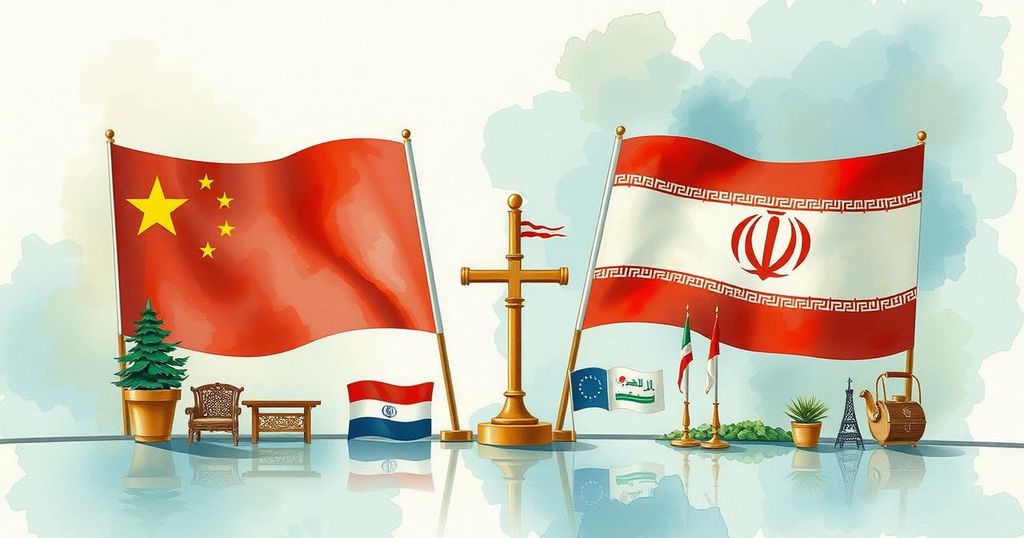China has taken a cautious diplomatic stance amid the Iran-Israel conflict, condemning the attacks without offering military support. The government emphasizes dialogue and a ceasefire, reflecting a preference for risk-averse diplomacy grounded in economic interests. As tensions in the Middle East affect its business interests, Beijing seeks to maintain stability without alienating major partners.
Beijing, a longtime ally of Tehran, is now engaging in cautious diplomacy amid the ongoing conflict between Iran and Israel. Following Israel’s recent attacks on Iran, the Chinese government condemned the actions and called for de-escalation. President Xi Jinping quickly reached out to Russian President Vladimir Putin, urging for a ceasefire, while China’s Foreign Minister communicated with his Iranian counterpart. However, despite the rhetoric, China did not offer military support, showcasing its hesitancy to get entangled directly in Middle Eastern conflicts.
Despite its ambitions as a global player and its economic ties to the region, analysts suggest China’s lack of military involvement illustrates its limitations in effectively influencing Middle Eastern politics. Jude Blanchette from the RAND Corporation pointed out that Beijing lacks both the diplomatic means and the willingness to plunge into such a volatile situation. “Beijing isn’t inclined to stick its neck out,” he noted, emphasizing its preference for a risk-averse approach during these tumultuous times.
China’s economic interests are undoubtedly at stake in the region. Zhu Feng, a prominent scholar at Nanjing University, pointed out that the continued instability affects China’s business and economic security. Tensions were heightened when the Iranian parliament proposed shutting down the strategic Strait of Hormuz, which led to a stern response from China, urging for peaceful resolutions to prevent further regional turmoil.
That said, the balance of China’s actions has been muted. Craig Singleton from the Foundation for Defense of Democracies summarized Beijing’s stance as one of “steady oil buys and ritual calls for ‘dialogue’.” He added that even after the conflict began, China showed no willingness to provide military hardware or financial assistance, only opting for diplomatic words to appease Tehran without antagonizing Saudi Arabia or the U.S.
China’s good-standing rhetoric with Iran contrasts sharply with its actions, revealing a gap between its ambitions and its actual influence. Singleton mentioned that while China may profess support for Iran, it remains focused mainly on economic interests rather than military alliances during crises — a position that often requires it to maintain a low profile.
Throughout the conflict’s escalation, China has continued to emphasize diplomacy. Having previously facilitated diplomatic talks between Iran and Saudi Arabia, it has remained vocal about its stance on international platforms like the UN Security Council. A recent resolution drafted with Russia criticized attacks on Iran and demanded a ceasefire, though it’s poised for a likely veto from the U.S.
Chinese Foreign Minister Wang Yi has communicated with his Iranian counterpart to underline China’s disapproval of Israeli actions. After recent calls with other regional foreign ministers and discussions with Russia, China has positioned itself as a mediator but has avoided active involvement, maintaining a consistent stance of urging for talks instead of escalating military commitments.
Given the complex web of alliances and interests, especially considering Iran’s role in China’s Belt and Road Initiative, Beijing’s response is calculated. The Soufan Center’s analysis highlights how Beijing’s support for its partners is intricately linked to its broader economic and diplomatic goals. Ignoring these dynamics would risk undermining its relationships with key partners as tensions grow.
In conclusion, while China maintains its relationship with Iran amid the ongoing conflict with Israel, its actions reveal a cautious, calculated approach focused on economic stability rather than military involvement. Beijing has demonstrated its commitment to diplomacy through condemnation of attacks and calls for ceasefire, but has refrained from any substantial support, thus highlighting the fragility of its influence in the region and the complexities of its international interests.
Original Source: apnews.com






